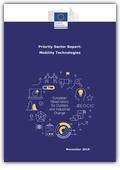
Mobility Technologies are a core part of the European manufacturing industry and are a clear focus for Europe’s strategy to re-industrialize. The aim of clustering mobility technologies industries is to help Europe's regions and countries design better and more evidence‐based cluster policies and initiatives.
The Mobility Technologies emerging industry includes all activities and agents providing products, services and technologies that enable people and goods to move around more freely and efficiently. Clusters can be understood as regional concentrations of economic activities in related industries connected through local linkages and spill-overs that have long been known to be a competitive feature of the market economy. Clusters in mobility technologies emerging industries are being determined based on the cluster mapping approach of the European Panorama for Clusters and Industrial Change. This approach measures cluster size, specialisation, employee productivity for the relevant industries in a region, SME (high-growth) performance and the innovation potential of global frontier firms.
Most of the regions with strong clusters in the industry are in areas of traditional automotive strength. Stuttgart is the leading cluster in Europe together with several other German clusters. However, the increasing focus on energy efficiency, alternative fuels, shared mobility, automated vehicles and transport systems will require changes in the business organisation models, skills sets and value chain structure of the emerging industries. This may represent at the same time challenges and opportunities for firms, depending on their ability and willingness to embrace change. Trough designing evidence-based clusters European Observatory for Clusters and Industrial Change aims to support industrial modernisation, foster Entrepreneurship in emerging industries with growth potential and enable more strategic inter‐regional collaboration and investments in the implementation of smart specialisation strategies.
